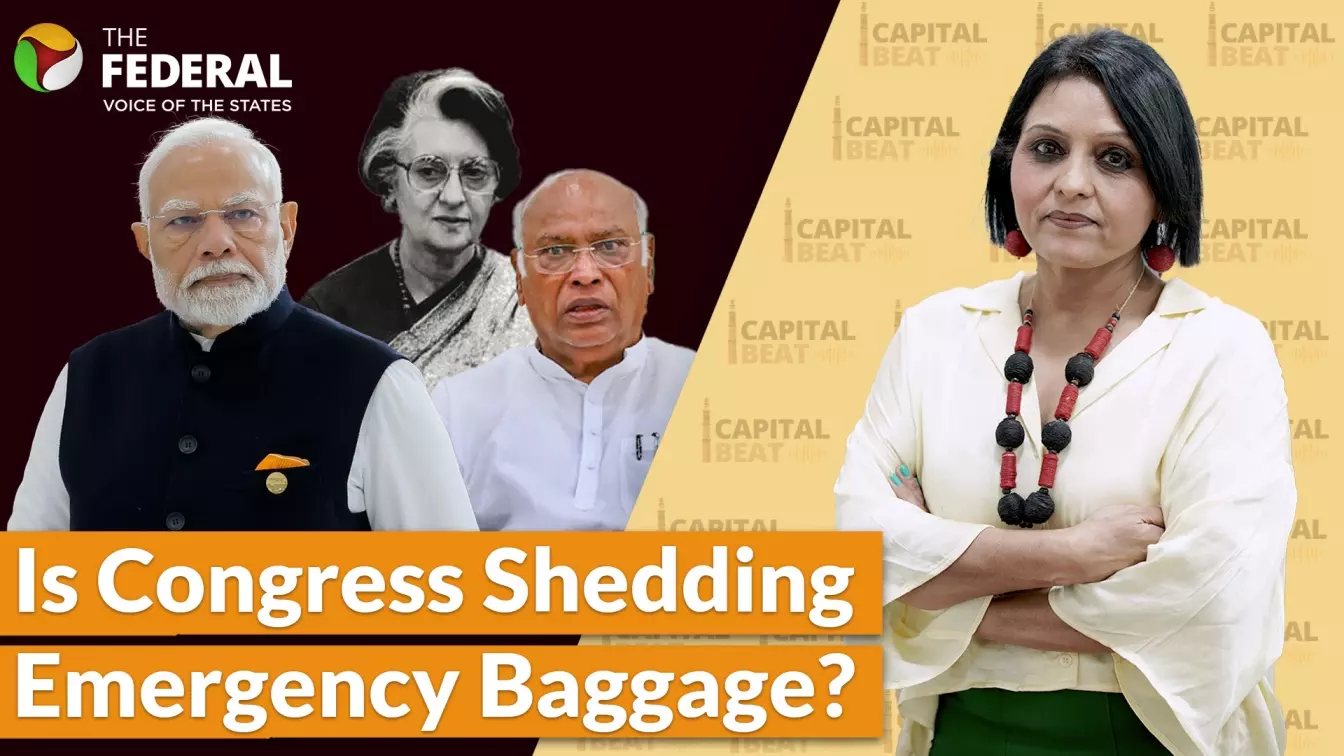
Discussion: Why is Kharge firing back at Modi govt over Emergency drama?
On Emergency’s 50th year, is Congress finally confronting its past to rewrite its political future?

Fifty years after the imposition of the Emergency, a period Prime Minister Narendra Modi termed one of the "darkest chapters in India's democratic history", the political discourse remains sharply divided.
Also read: No Indian will ever forget how spirit of Constitution was violated: PM Modi on Emergency
On this episode of Capital Beat, we delve into the escalating war of words between the BJP and the Congress. As the ruling party observes the day as 'Samvidhan Hathyadivas' (Constitution Murder Day), Congress President Mallikarjun Kharge launched a blistering counter-attack, marking a potential strategic shift for the Opposition party. S Srinivasan, Editor-in-Chief of The Federal, and veteran journalist Anand K Sahay join the discussion to analyse whether Congress is finally shedding the baggage of the Emergency and if the BJP's narrative can sustain its political impact.
The discussion opened with the significance of Kharge holding a press conference on June 25, an act not seen from a Congress president in recent memory. He accused the BJP of staging a "drama to hide governance failure" and asserted that a government with "no tolerance" has no right to lecture others on democracy.
Also read: 'Long Live Democracy Yatra', exhibition to mark 50 years of Emergency
Kharge slammed the BJP and its ideological parent, the RSS, stating that those who played no role in India's independence or the framing of the Constitution were now ironically positioning themselves as its saviours.
A political gimmick?
Sahay dismissed the BJP's observance of the day as a "plain and simple gimmick" orchestrated by the current government. He noted that previous non-Congress governments, including that of Atal Bihari Vajpayee, whose members were jailed during the Emergency, never marked the anniversary in such a formal, state-sponsored manner.
Also read: In 11 years of Modi rule, India has got an unusual version of democracy
"This is a new word, a new expression," Sahay said, referring to 'Hathyadivas'. He argued that the entire event is a coordinated effort led by the Prime Minister. "I can bet my last penny that if Mr. Modi stopped tweeting, they (other ministers) would also stop tweeting," he remarked.
Sahay further questioned the BJP's credentials to speak on Constitutional values, pointing to the historical stance of its associated organisations. "These people did not accept the Indian flag until quite recently... On what basis can they talk about a black day?" he asked, adding that BJP leaders themselves had campaigned on the promise of replacing the current Constitution if they secured a 400-seat majority.
'Undeclared emergency'
The core of the Congress's counter-narrative, as articulated by Kharge and analysed by the panellists, was the accusation of an "undeclared emergency" prevailing in the country today. Kharge raised issues of rising unemployment, corruption, the suppression of civil liberties, and the misuse of the constitution over the last decade.
Srinivasan saw this as a strategic move by the Opposition. "What Kharge probably tried to show today was that... if you had to talk about institutional collapse or... subversion of various other institutions, it is happening right now," Srinivasan explained.
He suggested that the Congress is using the occasion to highlight the current government's alleged democratic backsliding. While questioning if this signals a sustained, aggressive Opposition strategy, Srinivasan acknowledged the necessity of the move. "They also need to find some space. They have to get in and at least put a point across," he said, referring to the media landscape dominated by the government's narrative.
Shedding the baggage
The panel addressed the persistent question of whether the Congress can ever truly escape the shadow of the Emergency. While the host noted the lack of a formal apology similar to the one made by Dr. Manmohan Singh for the 1984 anti-Sikh riots, Sahay contended that the party has not shied away from the issue.
He recalled that Indira Gandhi herself had acknowledged her error. "She laughed and she said, 'by that one stroke, I turned everybody against myself. It was a totally bad move on my part'," Sahay said, quoting a memoir by the late Pranab Mukherjee. He also mentioned that Priyanka Gandhi, during election campaigns, had told voters they were right to oust her grandmother after the Emergency.
According to Sahay, Kharge’s press conference was not a defensive move but a proactive response to a government circular directing states to observe the day, thereby challenging the government's premise head-on.
Battle for narrative
Looking ahead, the panellists debated the longevity and effectiveness of the BJP's strategy. Sahay was skeptical that the 'Samvidhan Hathyadivas' narrative would resonate with younger generations, who constitute a majority of the population and were not even born in 1975.
"Population is not swayed by those things; they are mainly swayed by their own living conditions which are miserable," he argued, suggesting that the BJP's focus on a 50-year-old event is a diversion from pressing issues like Chinese border incursions and economic distress.
Srinivasan concluded that such days are deployed by political parties "to bring certain memories and build a certain narrative." The crucial factor, he said, is the Opposition's ability to "slice through this and tell their section of the audience" a more complete story.
Whether Kharge’s press conference was a one-off event or the beginning of a sustained counter-offensive remains to be seen.
(The content above has been generated using a fine-tuned AI model. To ensure accuracy, quality, and editorial integrity, we employ a Human-In-The-Loop (HITL) process. While AI assists in creating the initial draft, our experienced editorial team carefully reviews, edits, and refines the content before publication. At The Federal, we combine the efficiency of AI with the expertise of human editors to deliver reliable and insightful journalism.)

